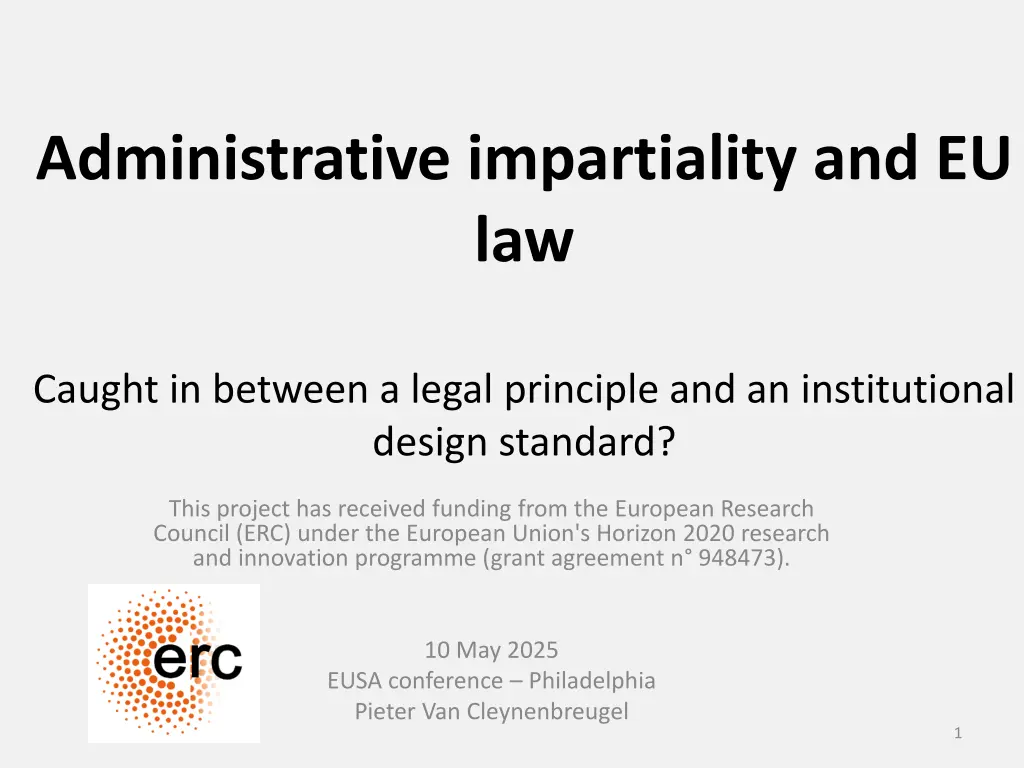
Administrative Impartiality and EU Law: Balancing Legal Principles
Explore the concept of impartiality in administrative decision-making within the framework of EU law, delving into the intersection between legal principles and institutional design standards. This project delves into the nuances of administrative impartiality and its broader implications for the European Union's governance structure while considering its implications on independence and decision-making processes.
Download Presentation

Please find below an Image/Link to download the presentation.
The content on the website is provided AS IS for your information and personal use only. It may not be sold, licensed, or shared on other websites without obtaining consent from the author. If you encounter any issues during the download, it is possible that the publisher has removed the file from their server.
You are allowed to download the files provided on this website for personal or commercial use, subject to the condition that they are used lawfully. All files are the property of their respective owners.
The content on the website is provided AS IS for your information and personal use only. It may not be sold, licensed, or shared on other websites without obtaining consent from the author.
E N D
Presentation Transcript
Administrative impartiality and EU law Caught in between a legal principle and an institutional design standard? This project has received funding from the European Research Council (ERC) under the European Union's Horizon 2020 research and innovation programme (grant agreement n 948473). 10 May 2025 EUSA conference Philadelphia Pieter Van Cleynenbreugel 1
Overview Impartiality in administrative decision-making Caught in between a legal principle and an institutional design standard 2
Overview Impartiality in administrative decision-making Caught in between a legal principle and an institutional design standard 3
Impartiality The requirement of impartiality covers all circumstances in which an official or agent who is called upon to decide on an issue must reasonably consider that issue as being of such a nature as to be viewed by third parties as a possible source of impairment of his or her independence in that matter (C-167/06P, Kominou) no (impression of) personal interests implicating the decision-making process independence or detachement from the facts and outcomes of a given case subjective impartiality objective impartiality compare with judicial impartiality art. 6 ECHR and art. 47 CFREU 4
Impartiality principle of good administration art. 41 CFREU: every person is entitled to have his or her affairs handled impartially by an EU institution, office, body or agency general requirement, made specific by right to be heard, right of access to one s file and duty to state reasons objective and subjective impartiality limited case law, including Cases C-512/15, Spain v Council; C-680/16 P, Wolff and Remedia v Commission; C-6/21 P, Germany v Pharma Mar and Commission; C-291/22 P, D & A Pharma v Commission general principle of EU law: extends to Member States administrations when acting within the scope of EU law (Case ) no exceptions <-> nat l laws of (some) Member States objective and subjective impartiality requirements: Case C-269/90, TU M nchen related to duty of care recent CJEU case law only deals with impartiality of the judiciary, see Joined Cases C-554/21, C-622/21 and C-727/21, Hann-Invest; C-53/23, Association of judges and C-369/23, Vivacom Bulgaria 5
Impartiality Secondary legislation requirement additionally and explicitly imposed on national administrative authorities and bodies impartiality as a corrollary to the setup of independent authorities e.g. Directive 2019/1 (ECN +) impartiality as an explicit requirement for administrative decision- making, detached from independence e.g. art. 5 Reg. 2017/625 (food safety) and art. 10 Dir. 2013/32 (asylum procedures) impartiality not mentioned next to other organisational requirements (e.g. GDPR) impartiality as a condition that can exceptionally be set aside (art. 3(3) Directive 2024/1500 equality bodies) on other occasions, no such references (e.g. border controls) despite EU general principles also applying 6
Overview Impartiality in administrative decision-making Caught in between a legal principle and an institutional design standard 7
Caught in between? Legal principle uniformly applicable across all sectors? uncertain, as case law is lacking legislative sector-specific nuances as to the implementation and operation of impartiality requirements Standard of institutional design for Member States administrations requirements accompanying other organisational requirements related to the effective enforcement of EU law rather than to respect for a pre-determined abstract legal principle 8
Caught in between? Two ways of ensuring respect for impartiality requirements individual level : EU administrative law perspective individual right to objective and subjective impartiality claim before national courts legal consequences in individual case: annulment of decision or other consequences, in line with national law and principles of equivalence and effectiveness 9
Caught in between? systemic level : EU legal process perspective side effect of legislative references to impartiality quasi-judicial impartiality required from MS administrations? no fully autonomous legal meaning, making impartiality as a legal principle less relevant focus on effet utile use of principle of effectiveness? Case C-308/19, Whiteland Import Export SRL Case C-511/23, Caronte & Tourist SpA claim to be made by individuals as well? no testing ground yet 10
Caught in between? Caught in between? study of principle of impartiality shows the limits of EU administrative law as a conceptual framework link between judicial and administrative impartiality? impartiality claims detached from overall effectiveness claims? EU legal process perspective has its own shortcomings who enforces the legal process? Who should do so? Is there something as EU legal process that can be captured neutrally by legal scholarship? in practice: impartiality as a requirement in a broader effectiveness framework, but how to define that framework in a legally sound manner? law alone cannot bring the clarity one (I, at least) would desire in this context 11
Thank you for your attention! pieter.vancleynenbreugel@uliege.be 12
